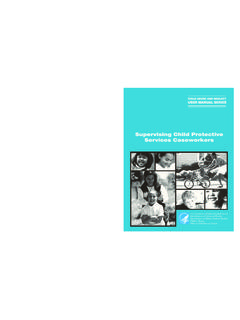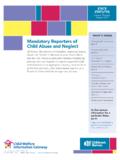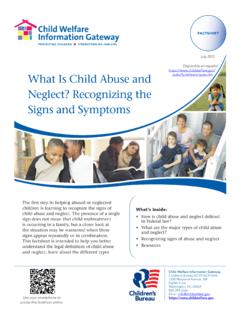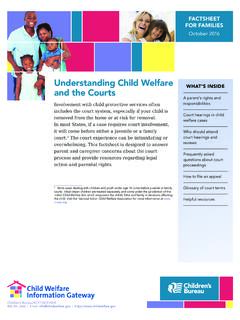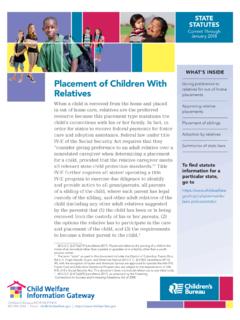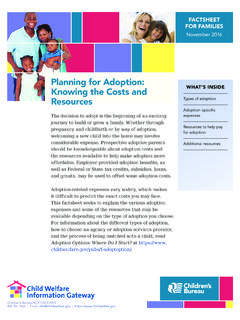Transcription of Reasonable Efforts to Preserve or Reunify Families …
1 Children s Bureau/ACYF/ | Email: | STATUTESC urrent Through March 2016 Reasonable Efforts to Preserve or Reunify Families and Achieve Permanency for Children WHAT S INSIDEWhen Reasonable Efforts are requiredWhen Reasonable Efforts are not requiredSummaries of State lawsTo find statute information for a particular State, go to Reasonable Efforts refers to activities of State social services agencies that aim to provide the assistance and services needed to Preserve and Reunify in all States, the District of Columbia, Guam, Puerto Rico, and the Virgin Islands require that child welfare agencies make Reasonable Efforts to provide services that will help Families remedy the conditions that brought the child and family into the child welfare system.
2 The statutes in most States use a broad definition of what constitutes Reasonable Efforts . Generally, these Efforts consist of accessible, available, and culturally appropriate services that are designed to improve the capacity of Families to provide safe and stable homes for their children. These services may include family therapy, parenting classes, drug and alcohol abuse treatment, respite care, parent support groups, and home visiting programs. Some commonly used terms associated with Reasonable Efforts include family reunification, family preservation, family support, and preventive services.
3 1 1 Services to be provided to the child and family are specified in a case plan. For more information on the case planning process, see Information Gateway s Case Planning for Families Involved With Child Welfare Agencies at TuhoggnMaehanhcMueuM2uhnMhCu0t1g6hprs1T1 uehrt: :Muth2 This material may be freely reproduced and distributed. However, when doing so, please credit Child Welfare Information Gateway. This publication is available online at Reasonable Efforts Are RequiredFederal law has long required State agencies to demonstrate that Reasonable Efforts have been made to provide assistance and services to prevent the removal of a child from his or her home and to make it possible for a child who has been placed in out-of-home care to be reunited with his or her Beginning with the Adoption Assistance and Child Welfare Act of 1980 ( 96-272).
4 Reasonable Efforts are made when the child and his or her family are provided with services that are relevant to their situation, which may include: Child care Homemaker services Individual, group, and family counseling Health-care services Behavioral health evaluation and treatment Drug and alcohol abuse counseling Parent education Vocational counselingCommunity-based family support services that promote the safety and well-being of children and Families also may be offered. These services are designed to: Increase family strength and stability Increase parent confidence and competence Afford children safe, stable, and supportive family environments Enhance child developmentIn many States, the statutes also require that when a court determines that family reunification is not in the best interests of the child Efforts should be made to finalize another permanent placement for the child.
5 Under the Adoption and Safe Families Act of 1997 (ASFA), while Reasonable Efforts to Preserve and Reunify Families are still required, the child s health and safety constitute the paramount concern in determining the extent to which Reasonable Efforts should be States must comply with the requirements outlined in ASFA as a condition for receiving certain Federal Reasonable Efforts Are NOT RequiredUnder the provisions of ASFA, Reasonable Efforts to Preserve or Reunify the family are not required when the court has determined any of the following: The parent subjected the child to aggravated circumstances as defined by State law.
6 The definition of aggravated circumstances may include, but is not limited to, abandonment, torture, chronic abuse, and sexual abuse. The parent committed murder of another child of the parent. The parent committed voluntary manslaughter of another child of the parent. The parent aided or abetted, attempted, conspired, or solicited to commit such a murder or voluntary manslaughter. The parent committed a felony assault that resulted in serious bodily injury to the child or another child of the parent. The parental rights of the parent to a sibling of the child were terminated involuntarily.
7 In all States, the District of Columbia, Puerto Rico, and the Virgin Islands, Reasonable Efforts are not required under these circumstances. In addition, several States, the District of Columbia, Puerto Rico, and the Virgin Islands provide one or more additional grounds for not making Reasonable Efforts . The following are examples of these additional grounds: The parent abandoned the child (36 States, Puerto Rico, and the Virgin Islands).44 Alaska, Arizona, California, Connecticut, Delaware, Florida, Idaho, Iowa, Kentucky, Maine, Maryland, Massachusetts, Michigan, Mississippi, Montana, Nebraska, Nevada, New Hampshire, New Jersey, New York, North Carolina, North Dakota, Ohio, Oregon, Pennsylvania, Rhode Island, South Carolina, South Dakota, Tennessee, Texas, Utah, Vermont, Virginia, West Virginia, Wisconsin, and Wyoming.
8 The parent abandoned an infant (11 States).55 Alabama, Alaska, Arkansas, Hawaii, Indiana, Minnesota, Nevada, Oklahoma, Tennessee, Washington, and TuhoggnMaehanhcMueuM2uhnMhCu0t1g6hprs1T1 uehrt: :Muth3 This material may be freely reproduced and distributed. However, when doing so, please credit Child Welfare Information Gateway. This publication is available online at The parent was convicted of murder or voluntary manslaughter of the child s other parent (13 States and the Virgin Islands).66 Alabama, Alaska, Florida, Indiana, Maryland, Massachusetts, New Hampshire, New Mexico, Oregon, Utah, Virginia, Washington, and West Virginia.
9 The parent was convicted of the crime of trafficking in persons (four States).77 Idaho, Ohio, Texas, and Washington. The child was removed from the home previously due to abuse or neglect and was removed again due to a subsequent incident of abuse or neglect (eight States, Puerto Rico, and the Virgin Islands).88 Alaska, Arizona, Arkansas, California, Florida, Nevada, South Dakota, and Utah. The parent was convicted of a sexual offense that resulted in the child s conception (four States).99 California, Connecticut, Florida, and Washington. The parent is a registered sex offender or required to register on a sex offender registry (14 States and the District of Columbia).
10 1010 Arkansas, Georgia, Hawaii, Kentucky, Michigan, Minnesota, Nevada, North Carolina, Oklahoma, South Dakota, Texas, Utah, West Virginia, and Wyoming. The parent failed to comply with the terms of a reunification plan (nine States, Puerto Rico, and the Virgin Islands).1111 Alabama, Alaska, California, Florida, Kansas, Maine, Minnesota, Washington, and West Virginia. The parent has been incarcerated for a substantial term in relation to the child s age, and there is no suitable relative to care for the child (seven States).1212 Alabama, Alaska, Florida, Kentucky, New York, North Dakota, and South Dakota.
